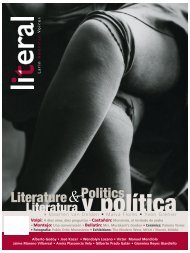Giobany Arévalo > Gabriela Torres Olivares >Anuar Jalife - Literal
Giobany Arévalo > Gabriela Torres Olivares >Anuar Jalife - Literal
Giobany Arévalo > Gabriela Torres Olivares >Anuar Jalife - Literal
You also want an ePaper? Increase the reach of your titles
YUMPU automatically turns print PDFs into web optimized ePapers that Google loves.
(I don’t think two dozen pages or so stapled together<br />
constitutes a book do you?) But no matter what you call<br />
them or how large or small they are, they can, and are<br />
intellectually interesting works.<br />
Yet for some philosophy and comic books stand<br />
at opposite ends when it comes to intellectual rigour,<br />
acceptability and admirability. Yet this needs not be the<br />
case. Each can be used to encourage a better understanding<br />
and appreciation of the other. Now reading<br />
Batman will not solve the world’s problems or even your<br />
own – I mean, come on, what slim book could? However<br />
even at a simple introductory level can one not at<br />
least think about feminism (or the lack there of) in Wonder<br />
Woman? Or what about the nature of Justice in any<br />
other superhero comic? Sometimes with intentionality<br />
and sometimes without, comic book creators have dealt<br />
with signifi cant social, political, ethical and even metaphysical<br />
issues. More often than not the treatments of<br />
these issues have been underwhelming but simply refl<br />
ects the general aim of the medium. By that I simply<br />
mean that the mainstream super hero comic books that<br />
you used to read are entertainments, they are meant<br />
as a diversions. One of the diversions that I speak of is<br />
imagination. That the reader actually takes a moment<br />
to think about what he or she would do in the hero’s<br />
(or villain’s) place is enough to start a discussion. Comic<br />
books would kill their popularity if they started to get<br />
all preachy at us. Let’s leave that up to the others shall<br />
we? (no, I am not alluding to philosophers here so relax<br />
will you?)<br />
Any “crack in the door“ that moves beyond merely<br />
engaging the reader for a few minutes can allow him or<br />
her to glimpse and wonder about what may be at the<br />
other end of the spectrum that I was speaking about<br />
earlier. That is, a comic book may use racism or sexism<br />
to create a dramatic sequence of events and these<br />
may move the reader into greater theoretical concerns<br />
about discrimination in general. A reader may come to<br />
sympathize with a comic superhero who faces constant<br />
personal sacrifi ce in order to deal with bigger issues of<br />
moral duty and responsibility. Even the comic book universes<br />
in which these characters exist suggest certain<br />
metaphysical perspectives about truth and reality. Finally,<br />
to mention the most obvious, but perhaps the most<br />
overlooked is the creative process of the comic book artifact<br />
itself which gives us a rich example of aesthetics.<br />
Don’t think they are art?<br />
Jeff McLaughlin is author/editor of Comics as Philosophy,<br />
and Stan Lee:Conversations. His next book due out<br />
in October is Philosophy in Black, White and Color.<br />
asunto de connotaciones. Muchas de las llamadas “novelas<br />
grafi cas” no son novelas (algunas de las mejores no<br />
son siquiera fi cción), así como la mayoría de los cómics<br />
no son en absoluto cómicos. Por lo que respecta a los<br />
books no creo que dos docenas de páginas engrapadas<br />
constituyan en conjunto un libro, ¿o sí? Pero no importa<br />
cómo se les llame o qué tan extensos o pequeños sean:<br />
pueden ser –y son– intelectualmente interesantes.<br />
Según algunos, cuando se trata de rigor intelectual<br />
la fi losofía y los cómics están en extremos opuestos.<br />
Pero no tiene por qué ser necesariamente así: cada uno<br />
es susceptible de ser empleado para una mayor comprensión<br />
del otro. Ahora bien, leer Batman no resolverá<br />
los problemas del mundo, ni siquiera los propios –¡por<br />
favor!, ¿qué libro de bolsillo podría hacerlo? Sin embargo,<br />
aun en un nivel elemental uno no puede menos que<br />
pensar acerca del feminismo –o su ausencia– en La mujer<br />
maravilla o sobre la naturaleza de la justicia en cualquier<br />
otro súper héroe. A veces de manera intencional, otras<br />
no, los creadores de cómics han tratado temas relevantes<br />
tanto sociales como políticos, éticos y aun metafísicos.<br />
La mayoría de las veces esos temas se han abordado<br />
con cierta simpleza, refl ejando la corriente dominante<br />
del medio. Las tiras de súper héroes son de entretenimiento<br />
y su objetivo es la diversión. Ahora bien, se trata<br />
de un esparcimiento que tiene que ver también con la<br />
imaginación. Que el lector se tome un momento para<br />
pensar en lo que haría si estuviera en el caso del héroe<br />
o del villano: se trata de un material sufi ciente como<br />
para suscitar un debate. Los cómics atentarían contra sí<br />
mismos si trataran de hablarnos en términos de prédica<br />
parroquial. Dejemos eso a otros, por favor. (No, no me<br />
estoy refi riendo aquí a los fi lósofos, así que relájense).<br />
Cualquier rendija que mueva al lector más allá de la<br />
mera simpatía puede permitirle un vistazo para vislumbrar<br />
e interrogarse sobre lo que hay al otro extremo del espectro.<br />
Un cómic aborda el racismo o el sexismo creando una<br />
secuencia dramática de eventos, los cuales, quizá, pueden<br />
inducir al lector hacia mayores preocupaciones teoréticas<br />
acerca de la discriminación en general. El lector puede llegar<br />
a identifi carse con un héroe que enfrenta el sacrifi cio<br />
en aras del deber moral y la responsabilidad. Es más, los<br />
universos de las historietas sugieren incluso perspectivas<br />
metafísicas acerca de la verdad y la realidad. Finalmente<br />
se encuentra el proceso creativo de un cómic, el que puede<br />
ofrecerse como una rica manifestación estética en sí.<br />
¿No cree usted que los cómics son artísticos...?<br />
Yet for some<br />
philosophy and<br />
comic books stand<br />
at opposite ends<br />
when it comes to<br />
intellectual rigour,<br />
acceptability and<br />
admirability. Yet<br />
this need not be<br />
the case. Each<br />
can be used to<br />
encourage a better<br />
understanding and<br />
appreciation of<br />
the other.<br />
OTOÑO, 2009 LITERAL. VOCES LATINOAMERICANAS 19






